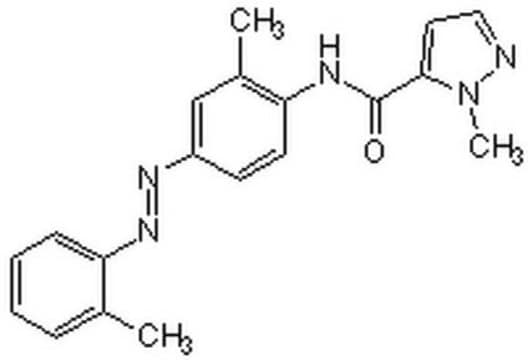C8124
CH-223191
≥98% (HPLC), powder, AhR antagonist
Sinónimos:
1-Methyl-N-[2-methyl-4-[2-(2-methylphenyl)diazenyl]phen yl-1H-pyrazole-5-carboxamide, 2-Methyl-2H-pyrazole-3-carboxylic acid (2-methyl-4-o-tolylazo-phenyl)-amide
About This Item
Productos recomendados
product name
CH-223191,
assay
≥98% (HPLC)
Quality Level
form
powder
color
orange-brown
solubility
DMSO: ≥20 mg/mL
storage temp.
2-8°C
SMILES string
Cc1cc(ccc1NC(=O)c2ccnn2C)\N=N\c3ccccc3C
InChI
1S/C19H19N5O/c1-13-6-4-5-7-17(13)23-22-15-8-9-16(14(2)12-15)21-19(25)18-10-11-20-24(18)3/h4-12H,1-3H3,(H,21,25)/b23-22+
InChI key
LKTNEXPODAWWFM-GHVJWSGMSA-N
Application
Biochem/physiol Actions
Features and Benefits
Storage Class
11 - Combustible Solids
wgk_germany
WGK 3
flash_point_f
Not applicable
flash_point_c
Not applicable
Certificados de análisis (COA)
Busque Certificados de análisis (COA) introduciendo el número de lote del producto. Los números de lote se encuentran en la etiqueta del producto después de las palabras «Lot» o «Batch»
¿Ya tiene este producto?
Encuentre la documentación para los productos que ha comprado recientemente en la Biblioteca de documentos.
Los clientes también vieron
Artículos
We offer many products related to non-steroid nuclear receptors for your research needs.
We offer a variety of small molecule research tools, such as transcription factor modulators, inhibitors of chromatin modifying enzymes, and agonists/antagonists for target identification and validation in gene regulation research; a selection of these research tools is shown below.
Nuestro equipo de científicos tiene experiencia en todas las áreas de investigación: Ciencias de la vida, Ciencia de los materiales, Síntesis química, Cromatografía, Analítica y muchas otras.
Póngase en contacto con el Servicio técnico













